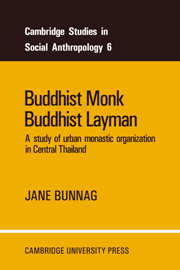Book contents
- Frontmatter
- Contents
- List of tables
- List of illustrations
- Preface
- Map A Thailand
- Introduction: the Thai social system
- 1 ‘The way of the monk’
- 2 The monk and the lay community
- 3 The wat community
- 4 The wat and its social matrix
- 5 The role of the Buddhist layman
- 6 The loosely structured social system: red herring or rara avis?
- Appendixes
- Bibliography
- Index
6 - The loosely structured social system: red herring or rara avis?
Published online by Cambridge University Press: 06 January 2010
- Frontmatter
- Contents
- List of tables
- List of illustrations
- Preface
- Map A Thailand
- Introduction: the Thai social system
- 1 ‘The way of the monk’
- 2 The monk and the lay community
- 3 The wat community
- 4 The wat and its social matrix
- 5 The role of the Buddhist layman
- 6 The loosely structured social system: red herring or rara avis?
- Appendixes
- Bibliography
- Index
Summary
A recurrent theme in Thai anthropological literature has been a concern with the alleged ‘looseness’ of Thai society. Since the publication of John F. Embree's seminal article ‘Thailand: A Loosely Structured Social System’ (in the American Anthropologist 52, 1950), his assertion that Thai society is loosely structured has achieved fairly general recognition and acceptance. Embree maintained that in Thailand, by contrast with Japan where the social system is ‘closely structured’, ‘considerable variation in individual behaviour is sanctioned’ and that the Thais act in an individualistic manner within their ‘loosely integrated social structure’.
More recently a number of students of Thai society have assumed a somewhat more critical stance (see Evers, 1969), but on the whole they have chosen to refine rather than reject the concept of ‘loose-structuring’, despite the fact that most of them recognize that Embree's knowledge of the Thai situation and his theoretical tools may have been less than adequate. On the whole their attempts to cope with this crippling conceptual legacy only tend to confirm my own opinion that Embree's formulation has been a barrier rather than a stimulus to productive research into the Thai social situation. Nonetheless, we should try to see why the pursuit of this red herring has exercised the talents of so many for so long; what are the precise referents of the concept ‘loosely structured’? Is it intended to be an analytical or descriptive device, applicable to Thai society as a whole or only in part?
- Type
- Chapter
- Information
- Buddhist Monk, Buddhist LaymanA Study of Urban Monastic Organization in Central Thailand, pp. 180 - 187Publisher: Cambridge University PressPrint publication year: 1973



